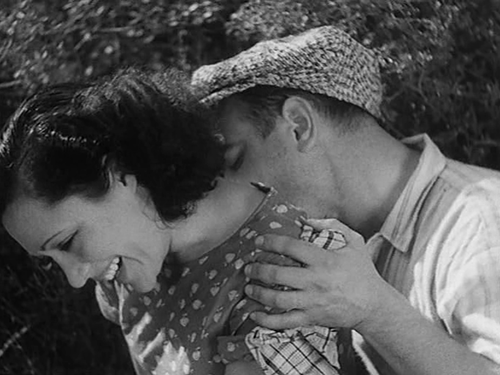
In the 1920s, the Provence is a magnet for immigrants seeking work in the quarries or in agriculture. Many mingle with locals and settle down permanently - like Toni, an Italian who has moved in with Marie, a Frenchwoman. Even a well-ordered existence is not immune from boredom, friendship, love, or enmity, and Toni gets entangled in a web of increasingly passionate relationships. For there is his best pal Fernand, but also Albert, his overbearing foreman; there is Sebastian, a steady Spanish peasant, but also Gabi, his young rogue relative; there is Marie, but there is also Josefa.
Eduardo Casais
“I saw Toni as the chance to really direct and to get free of the stupid conformism which afflicts so many of the people who run our industry. In short, Toni represented for me that liberty of esprit de corps without which no one in the world is capable of doing good work.
I learned a lot from Toni. This film gave me the courage necessary to try new things, to move in new directions.”
Jean Renoir1
“I think I may say that what characterized Toni is the absence of any dominating element, whether star performer, setting or situation. My aim was to give the impression that I was carrying a camera and microphone in my pocket and recording whatever came my way, regardless of its comparative importance. Nevertheless, I had given myself a framework. Toni is not a documentary: it is a news item, a love-story that really happened in Le Martigues … I scarcely needed to adapt it for the screen.”
Jean Renoir2
“The most remarkable thing about the movie is not the contrast of the characters of the two women but the delineation of the two distinct stages in the life of one woman, Josepha. Before her marriage to Albert she is a seductive tease, exciting, irresistible. Afterward, she becomes just another poor victimized woman, like Marie. The scene where Josepha, stung by a wasp, implores Toni to suck out the poison, all the poison, is unforgettable.In every gesture of Max Dalban in the role of Albert one can recognise Renoir caricaturing himself as he directs his lookalike. Toni is one of the five or six most beautiful of Renoir’s films, a tragedy in which the sun takes the place of Fate.”
François Truffaut3
“Toni is the most antitheatrical, the most deglamourised of Renoir’s films, and as a film about ‘labouring humanity’ it is something closer to the bone than I suspect Carné ever envisioned or achieved. Toni is the first film by Renoir to be shot entirely on location with direct sound, for both its interiors and its exteriors. Which in itself sets the film and the film maker apart from the mainstreams of French commercial cinema in 1934. As the most naturalistic of Renoir’s films, Toni picks up a thread in the history of the cinema virtually lost since André Antoine’s plea for a new naturalism as the proper responsibility of the cinematograph and rarely discovered again until the advent of postwar Italian neorealism.”
Christopher Faulkner4
“What one ultimately carries away from Toni, in fact, is a memory of felt presences rather than incarnations. One remembers heat and light – the warmth of the sun as well as that of the characters with their broad Midi, Italian, Spanish, and African accents, denoting generosity and luminosity in a bleak and difficult environment; the crackling fire beside which Fernand attempts to console Toni no less than the shiny grapes that Toni and Josefa share; the gentleness of Toni and the empathy of Fernand as well as the more volatile passions of Marie and Josefa; and the lighted window of the vineyard cottage that serves as a beacon to Toni’s longings as he dreams of love and escape.”
Jonathan Rosenbaum5
- 1Jean Renoir, “Souvenirs,” Le Point, no. 18 (December 1938), 275-286. Reprinted in André Bazin, Jean Renoir (New York: Simon and Schuster, 1973).
- 2Jean Renoir, My Life and my Films, trans. Norman Denny (London: Collins, 1974).
- 3François Truffaut, “Filmography,” in André Bazin (ed.), Jean Renoir (New York: Simon and Schuster, 1973), trans. W.W. Halsey II and William H. Simon.
- 4Christopher Faulkner, The Social Cinema of Jean Renoir (Princeton: Princeton University Press, 1986), 43-4.
- 5Jonathan Rosenbaum, “Toni,” Montly Film Bulletin (October 1974).

